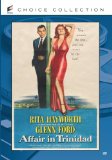| Reviews & Columns |
|
Reviews DVD TV on DVD Blu-ray 4K UHD International DVDs In Theaters Reviews by Studio Video Games Features Collector Series DVDs Easter Egg Database Interviews DVD Talk Radio Feature Articles Columns Anime Talk DVD Savant Horror DVDs The M.O.D. Squad Art House HD Talk Silent DVD
|
DVD Talk Forum |
|
|
| Resources |
|
DVD Price Search Customer Service #'s RCE Info Links |
|
Columns
|
|
|
Affair in Trinidad (Sony Choice Collection)
"You want what you can't have."
A disappointment. Sony Pictures' Choice Collection line of hard-to-find cult and library titles has re-released Affair in Trinidad, Columbia Pictures' half-baked Caribbean spy thriller/film noir from 1952 that re-teamed the famous Gilda co-stars Rita Hayworth and Glenn Ford. Rita dances a couple of times (to paralyzing effect) and Ford works himself up into an angry, tight, impotent sweat throughout, while spies (or saboteurs or gun runners or whatever the hell they are) make things difficult for the photogenic couple--and all to very little effect. You'll remember Rita's bumps and grinds, but that's about it for this whisper-thin exercise in foreign intrigue and romance. No extras this time around for this good-looking fullscreen black and white transfer (it appears to be the same one used for Sony's previous Martini Movies release of Affair).
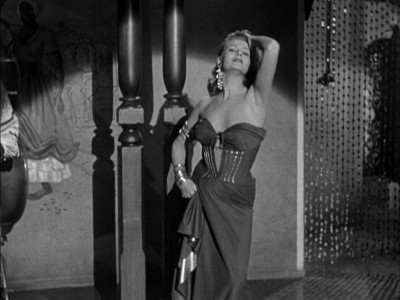
In exotic, colorful Trinidad, there is no great natural wonder than Chris Emery (Rita Hayworth), a va-va-va-voom vivacious nightclub dancer and singer who sets Port of Spain on its ear every night at the Caribe Club. One night, after finishing her number, Trinidad Lady (where lush, ample Chris sambas barefoot while putting her hands in that gorgeous red mane of hers and messing it all up while biting that sexy mouth of hers and...um...what was I saying?), she learns from local police inspector Smythe (Torin Thatcher) and American consul Anderson (Howard Wendell), that her artist husband Neal Emery has killed himself down at the docks. Smythe takes this opportunity to question Chris about her closeness to Max Fabian (Alexander Scourby), an ultra-smooth local "fixer" with plenty of dough who's made it quite clear around town that he has the hots for Chris. It seems that Max recently paid Neal an awful lot of money for his questionable paintings, arousing the interest of the suspicious Smythe. Chris, fed up with the insinuations that she's a tramp, decides to leave Trinidad the next day, but she's stopped by Smythe, who threatens to drag her already dingy good name right through the mud in a messy court case against Fabian--because they have enough evidence (including a witness) to at least harass Fabian over the death of Neal--a death they now believe to be murder, not suicide. What Smythe and Anderson really want, though, is for Chris to go along with their plan to paper over Neal's murder so that Chris can get, ahem, close to Fabian. They suspect Fabian of buying and selling secrets detrimental to the security of Britain (Trinidad was a British colony at the time), but they don't have any real proof. That's where Chris will come in. She reluctantly (and rather illogically) agrees to the plan. However, complications immediately arise when Chris is confronted by Neal's brother, Steve (Glenn Ford), a hotshot pilot who just received a letter from the seemingly happy Neal, offering him a job down in Trinidad. Steve can't understand how Chris could testify in court that Neal was a big downer, and he really can't believe that Neal, according to Chris, didn't touch her for years. Steve smells a big, fat rat with everything going on (including the police's indifference to his suspicions about Neal's "suicide"), but he decides to fall in love with Chris anyway. But her insistence on being close to Fabian sets into motion a series of events that...aren't all that exciting. However, Chris does get to dance one more time before the hurried denouement.
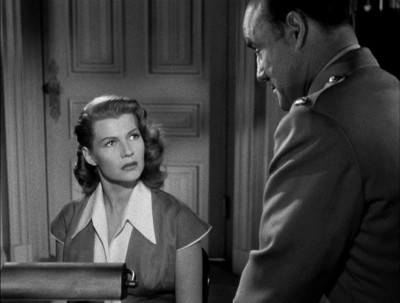
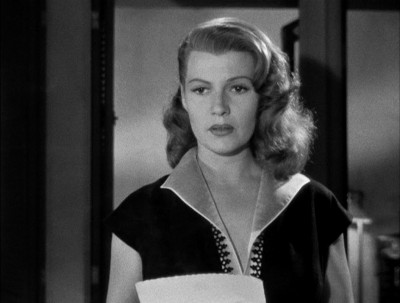
Four years before Affair in Trinidad premiered in 1952, Rita Hayworth stunned the movie world when she retired from the silver screen at age 30 to marry millionaire playboy/politician Prince Ali Khan. Somewhere in that sentence the phrase, "...at the height of her career..." is missing, and for good reason. It's generally accepted that Hayworth's career as the preeminent "love goddess" of the 1940s reached its peak with her iconic appearance in 1946's corrosively erotic film noir, Gilda, costarring Glenn Ford. Subsequent film appearances paled in importance, with the financial flop of real-life husband Orson Welles' 1948 The Lady From Shanghai seriously damaging her already stormy relationship with her boss, tyrannical Columbia studio head, Harry Cohn. After one more appearance with Ford in 1948 (The Loves of Carmen, which made money, but which showed her to poor advantage in a stilted costume drama the critics disliked), the already unstable Hayworth had had enough, and begged off for a break from filming the film adaptation of Born Yesterday. When her marriage fell apart in 1951, Cohn forced her to return to Hollywood to honor her original contract welcomed her back, and crafted Affair in Trinidad as her big comeback.
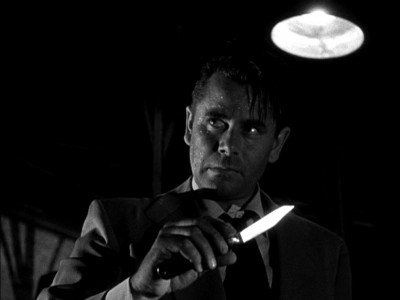
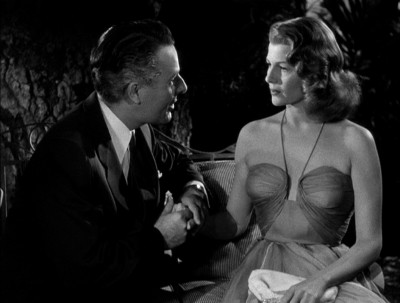
And it certainly worked out that way with the public, who made Affair in Trinidad a big, big box office hit (it even significantly out-grossed its superior inspiration, Gilda). Watching it today, though, it's apparent that Affair in Trinidad is a shaky patch-up job (at least eight writers worked in part on the never fully-completed script) combining elements of better films like Gilda and specifically, Hitchcock's Notorious (with some Casablanca thrown in there for good measure) in its rather glum, mechanical plot. It may not have mattered so much that the ideas behind Affair in Trinidad are so paltry, had the filmmakers worked out a consistent level of superficial romantic film noir trappings. However, Affair in Trinidad fails to entertain even on that basic level. In addition to using Hayworth basically as a prop for us to admire sexually, Affair in Trinidad's central motif borrows Notorious' "sex as a tool for espionage" hook as a starting and stopping point for both its plot and character motivation. But where Hitchcock found real depth in Bergman's guilt over actually giving herself sexually to a man she despises, this film states that Rita doesn't actually sleep with Max Fabian. And where Hitchcock increased the complexity of Notorious by implicating Grant in Bergman's downward spiral (he presses her into the situation, and then has the nerve to be offended by her actions when he falls in love with her), Ford doesn't even know Hayworth is working as a spy. His is a simple frustration borne out of intense sexual jealousy; the film humorously has Hayworth's boss, Wittol (the amusingly grotesque Steven Geray), explain how silly it is for Ford to be jealous of a goddess like Hayworth, because what else is he to expect but for her to be worshipped? Where Hitchcock provided true drama, Affair in Trinidad conjures up pasteboard plot mechanics.
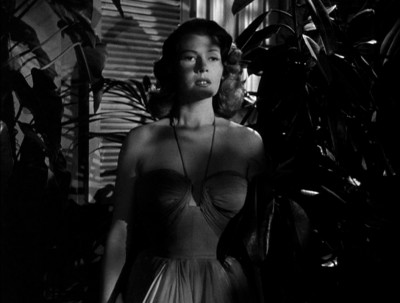
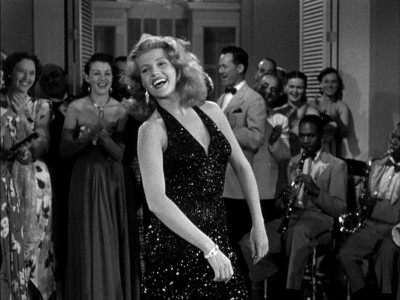
Even worse, except for the two sexually charged dances that Rita executes, and a nicely evocative scene out on a rainy porch, Affair in Trinidad offers precious few noir elements that could have made the film at the very least a superficially enjoyable potboiler (director Vincent Sherman could usually be counted on to deliver at the least a competent outing...but this is one of his slightest titles). While his houseguests carry a suggestion of perversity (conveyed strictly by exposition) that promises far more than is delivered, the film's main villain, Max Fabian, is sadly lacking in even the most basic noir villain conventions (Scourby is fatally subdued here, and utterly fails to ignite any tension with Ford, unlike the subversive homosexual undertones of Ford's relationship with George Macready in Gilda). Indeed, the whole film seems to promise sultry climes and shuttered blinds, hiding heated, horny sex and violence, but precious little of any of that materializes. Only one scene, where Ford and Hayworth smoke outside on a rainy porch, sizing each other up sexually before they clinch, plays like competent noir. And that's not enough framework on which to hang a whole film. It also doesn't help that the film's screenplay is a vague, plot hole-laden mess that doesn't confuse the viewers as much as bore them to tears. Who actually killed Neal? And more importantly, why? Why does Chris agree to the police's pressure to get involved with Max? She was leaving the island anyway, and her reputation was, it's implied, already sullied by hanging around Fabian. Why not just ride out the trial? Why did Neal really write that letter to Steve? Was Steve's profession as a flyer a factor, once we learn that spies were involved? And what the hell, exactly, are the spies up to? In fact, who the hell are the spies? East Germans? Russians? Nobody seems to know. And forget trying to figure out their plan to set up/occupy/compromise (take your pick) bases to strike the U.S. with the U.S.'s "own weapon" (one would assume the A-bomb). None of this is sufficiently answered to keep our interest--which is bad when we don't even have the simple noir pleasures we're entitled to here.
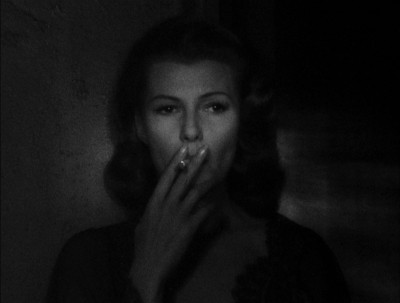
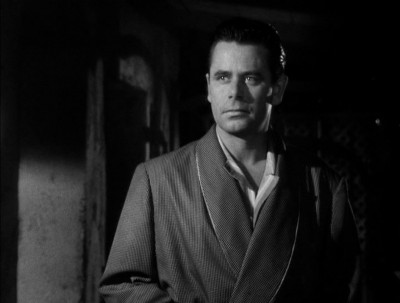
Of course, we do have the almost equalizing compensation of Rita Hayworth dancing. And in her two numbers, Lady Trinidad and the agreeably smutty I've Been Kissed Before, we truly see the absolute power that a genuine "love goddess," given the full Hollywood treatment, could exercise over an audience who is deeply involved in objectifying such a beautiful woman (can you imagine 60 years from now our future movie-watchers rhapsodizing about the likes of freakish works of science like Angelina Jolie, or androgynous ciphers like Sandra Bullock, or laughably asexual "Plain Janes" like Jennifer Aniston, or most ridiculously, the absolutely pathetic "woman-as-mouthy-little-brat" attention-getters like perpetually falling down Jennifer Lawrence?). Once Hayworth lost her youthful beauty (which, here in cinematographer Joseph Walker's careless lighting of the 33-year-old Hayworth, you can clearly see coming), she became, I've always felt, quite a competent actress (she's flat-out excellent in two later 50s favorites of mine: Separate Tables and They Came to Cordura). And you can see that she's trying for something just a little bit outside of what was normally asked of her, in Affair in Trinidad (her numb, shocked reaction to her husband's death here isn't bad). But it's obvious by this point, returning against her will after a long four-year hiatus (a life-time in Hollywood), that whatever small interest Hayworth may have originally had in her movie career, is now long gone. She just simply...fails to come to life in her dramatic scenes. It's only in the two dance numbers where you see the years and stress melt away, and the gorgeous, young, vibrant Margarita Carmen Cansino come startlingly alive. To say she's "sexy" is an understatement. Watching the highly charged, erotic Hayworth move sensuously across the screen, combining the grace and beauty of a trained dancer with the sexual power of a bump-and-grinder stripper, is more akin to witnessing an elemental force, rather than just a performer executing a production number. At one moment in the Lady Trinidad number, where Hayworth tilts back her head in simulated sexual ecstasy, biting her lip as she grinds to the samba beat, it's easy to come to an all-encompassing conclusion that, "This is what sex is all about." Leading into the finale of the number, Hayworth lifts her skirt in a surprisingly coarse manner, in full close-up, as if to say, "Get a real close look at the goods." But unfortunately, as demanded by the strict 1950s Production Code, the close camera stays rigidly above the waist: promise leads to empty tease. And that disappointing development fairly sums up Affair in Trinidad in total: a waist-up only film noir.
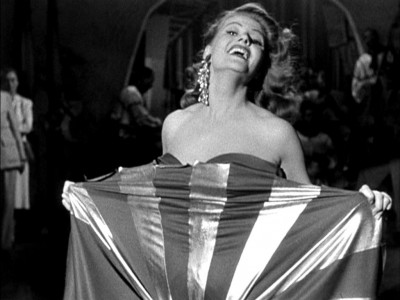
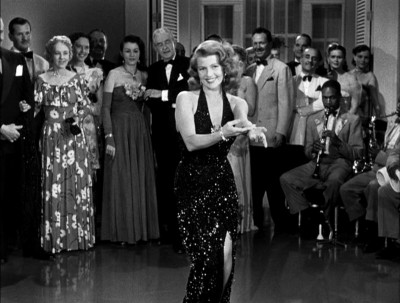
The DVD:
The Video:
The full-screen, 1.37:1 black and white transfer for Affair in Trinidad looked quite good, with blacks quite deep, while the gray scale was subtle. I did see some dirt and very minor scratches here and there, along with that sometimes noticeable video grain noise. But the overall image is sharp, with little or no compression issues.
The Audio:
The Dolby Digital English mono audio track was okay, with low hiss. No subtitles or closed-captions available.
The Extras:
Those stupid Martini Movies extras are missing here...but so is the original trailer, too, that was included on the original 2008 DVD release of Affair in Trinidad. No extras.
Final Thoughts:
A distressingly flat knock-off of Gilda and Notorious. Affair in Trinidad promises a lot in its first few anticipatory minutes, what with Rita Hayworth, fresh off a four-year hiatus, bumping and grinding up a storm down in the sweltering Caribbean. But promises aren't kept, and the re-teaming of Hayworth and Ford is a fizzle. A desultory, empty affair in Trinidad. However...an Affair in Trinidad rental is required if you want to see what a real woman looks like.
Paul Mavis is an internationally published movie and television historian, a member of the Online Film Critics Society, and the author of The Espionage Filmography.


|
| Popular Reviews |
| Sponsored Links |
|
|
| Sponsored Links |
|
|
| Release List | Reviews | Shop | Newsletter | Forum | DVD Giveaways | Blu-Ray | Advertise |
|
Copyright 2024 DVDTalk.com All Rights Reserved. Legal Info, Privacy Policy, Terms of Use,
Manage Preferences,
Your Privacy Choices | |||||||









